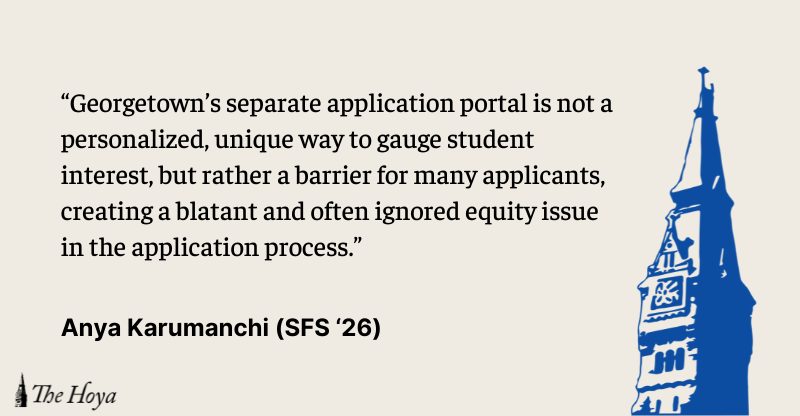As application deadlines approach for the future Georgetown University Class of 2027, memories of my own application season come flooding back. During some point in the admissions process, as applicants scrolls through their respective Common Application or Coalition Application, they learn about Georgetown’s “unique” application process that makes applying here even more tedious and burdensome than peer institutions.
Most colleges and universities use the Common Application or Coalition Application. On these sites, which require students’ biographical information, academic grades and letters of recommendation, the general application remains uniform regardless of the school to which a student is applying. As students select which universities they would like to apply to, they have a separate page for the written responses for each university. Though it may not mitigate the stress of writing random icebreaker essays like “What cheese would you be?” or the myriad benign “Why this school?” essays, this system does make the application process more streamlined, user-friendly and manageable for students.
Georgetown uses an entirely separate application portal, on the other hand, which requires submitting essays and other documents through an entirely different system from every other school. This forces students to create a list of extracurriculars with completely different word counts and specifications from those of the Common Application. Moreover, it obligates teachers to familiarize themselves with a new system to submit recommendations for their students.
Many Georgetown admissions officials pride themselves on the separate application process because it allows the admissions team to get to know applicants better. They claim the process is more personalized with their own portal.
However, Georgetown’s separate application portal is not a personalized, unique way to gauge student interest, but rather a barrier for many applicants, creating a blatant and often ignored equity issue in the application process.
By using a separate application portal, Georgetown significantly limits the number of people who are able and resourced enough to apply to the school. Potential Georgetown applicants may decide it is simply not worth trying to navigate and submit. It is undeniably difficult to complete a separate extracurricular section and harangue teachers and counselors to submit recommendations and other documents through a different, unfamiliar system.
This is especially true for students who come from high schools where students do not commonly apply to Georgetown or where there are limited resources available to learn about the application process. If Georgetown is truly committed to a class with diverse backgrounds, then it should be breaking down, not increasing, barriers to applications for these communities.
Many students decide whether to apply to schools based on the schools’ essay questions. Georgetown, however, forces students to pay a $75 fee merely to access its essays, erecting yet another barrier in its application process.
This deterrent is felt in the difference in application numbers from our peer institutions. While Georgetown received 26,670 applications from the Class of 2026, Duke University received 50,002, Northwestern University received 51,554, Boston College received 40,477 and Vanderbilt University received 46,717 applicants. There must be something barring people who are applying to Georgetown’s peer institutions. The answer is simple: a non-standard admissions portal with financial barriers.
Georgetown has also argued that it uses a separate application portal to evaluate demonstrated interest and have a personalized interview process. The idea is that only people most interested in Georgetown are worthy of being admitted, and this interest can be gauged by determining who is willing to go through the separate application process.
This reasoning does not seem worth barring students, however, who would otherwise be excellent members of our community. Demonstrated interest ought not be used as a measure in admissions, since the idea that making it through an obstacle course of an application process makes someone more fit to attend our university is misplaced.
Moreover, the effect of increased applications on the personalization of the process is small. Georgetown’s application process requires many essays, including two the length of a personal statement, and the quality, care and time put into those essays should be enough to show interest in the school.
The college admissions process should not be contingent on the fact that others are unable to apply because the process is too cumbersome. This process is already filled with countless inequities that benefit the wealthiest students, from access to standardized test preparation services to accessibility to college counselors. Though switching to the Common Application or Coalition Application may seem like a large step, there are many intermediary steps to take.
It is harmful to put barriers on students trying to apply for college. Georgetown’s admissions website declares its intent to recruit a diverse class from all walks of life. Yet the application process directly contradicts this goal. The university makes an already inequitable process more inequitable and misses out on students who could potentially be useful and bright additions to our community.
Anya Karumanchi is a first-year student in the School of Foreign Service.














